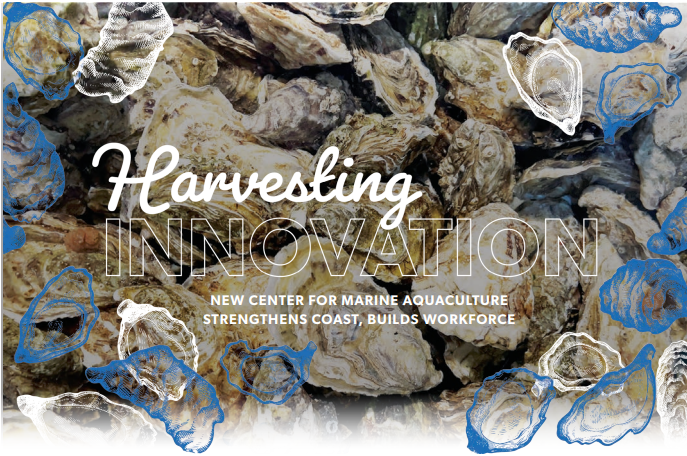Harte Research Institute Awarded Nearly $2 Million in State Grants for Coastal Science
CORPUS CHRISTI, Texas – Harte Research Institute for Gulf of Mexico Studies and Texas A&M University-Corpus Christi researchers have been awarded nearly $2 million in Texas Coastal Management Plan grants to study issues affecting the water quality of Baffin Bay, Texas; to continue a popular oyster reef restoration, outreach, and citizen science project; and to model the impacts of sea level rise and storm surge on the Texas Coast.
The Texas Coastal Management Program (CMP), funded by NOAA and managed by the Texas Land Commissioner and the General Land Office, focuses on the state’s coastal natural resource areas. Each year the CMP awards millions of dollars in grant money to state and local entities to fund projects on the Texas Coast that enhance the state’s natural resources.
“The scientists and staff at the Harte Research Institute are among the best in Texas, and being awarded these highly competitive CMP grants illustrates that point,” said HRI Senior Executive Director Dr. Larry McKinney. “It was especially gratifying to join forces with other TAMU-CC scientists to focus on Baffin Bay. Dr. Michael Wetz is the acknowledged expert on water quality in that system but the additional perspectives this grant provides will be a valuable addition to future restoration efforts.”
The projects include:
Principal Investigator: Dr. Michael Wetz, HRI Chair for Coastal Ecosystem Processes
Co-Principal Investigators: Dr. Dorina Murgulet, TAMU-CC Associate Professor of Hydrology and Director of the Center for Water Supply Studies; Dr. Mohamed Ahmed, TAMU-CC Assistant Professor of Geology-Geophysics, Dr. Hussain Abdulla, TAMU-CC Assistant Professor of Chemistry; and Dr. Joseph Felix, TAMU-CC Assistant Professor of Environmental Chemistry.
Baffin Bay provides critical habitat for important fish species but has experienced increasingly poor water quality that threatens health of the bay and its valuable fishery. This project will identify the sources of nutrient pollution in Baffin Bay in order to prioritize projects to restore the health of the entire watershed. High levels of nutrients can trigger explosions of algal growth that impact the system as a whole, causing fish kills and damaging the quality of the habitat. To discover the source of these issues, the team will conduct coordinated sampling in the bay and watershed across an 18-month period, and then feed that data into a computer model of the watershed that will help to determine any hot spots for nutrient loadings.
Principal Investigator: Dr. Jim Gibeaut, HRI Endowed Chair for Coastal and Marine Geospatial Sciences
HRI Lead Co-Investigators: Mukesh Subedee, HRI Research Data Scientist; Marissa Dotson, HRI Research and Reporting Analyst
The Texas Coast hosts a network of cities and towns, oil and gas production, heavy industry, shipping, commercial and recreational fishing, agriculture and tourism businesses. But this human infrastructure is nestled on a low-lying coastal plain, a dynamic system of coastal features and watersheds that are vulnerable to hazards like storm surge, rain flooding, wind, and coastal erosion. This project will use mapping and modeling technology to show how natural and human systems are linked, assess coastal change, sea level rise impacts, and storm surge impacts over time, and examine how these changes will affect human infrastructure in the future. This will provide residents, planners, and coastal environmental managers with the information they need to make resilient community planning decisions. It will also help to assess the impacts of conservation, restoration, and engineering decisions on the coast now and in the future. This work is part of the Texas Coastal Resiliency Master Plan 2023 efforts.
Principal Investigator: Dr. Jennifer Pollack, HRI Chair for Coastal Conservation and Restoration
Co-Principal Investigator: Gail Sutton, Associate Director for Institutional Initiatives, Finance and Administration
Oysters create habitat for fish and shellfish, filter and clean bay waters, protect shorelines from erosion, and are a valued commercial fishery. However, fishing pressure and natural and manmade disasters have taken a significant toll on Texas oyster habitat. This grant will continue the activities of HRI’s successful oyster recycling and conservation outreach program “Sink Your Shucks,” which takes oyster shells from local seafood restaurants and places them back in the estuary to create new reef habitat. This grant will enroll two new seafood restaurants into the shell recycling process and integrate citizen science into the program by recruiting a certified aquatic science teacher to visit schools, special programs, and events to provide support and resources. A research component will examine the performance of restored reefs that are fished versus reefs that are preserved in their restored state.









